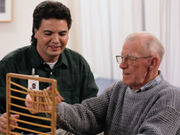Eight categories of sensory stimulation interventions identified, including music and light therapy
MONDAY, April 4, 2016 (HealthDay News) — For patients with dementia, there are many available sensory interventions that seem to have significant effects, according to a review published online March 31 in the Journal of Clinical Nursing.
Benedict S. Strøm, R.N., from VID Specialized University in Oslo, Norway, and colleagues conducted a systematic review of the literature to examine available sensory stimulation interventions and their effect on individuals with dementia. Fifty-five studies were included in the review.
The researchers found that 30 of the studies documented significant effect. The effect was mainly reported on negative behaviors, except for five studies which examined quality of life and well-being. Methodological limitations were identified in most studies. There were eight categories of sensory stimulation interventions: music, light therapy, acupressure/reflexology, massage-aromatherapy, and doll therapy/pet therapy/toy therapy, the Sonas program (a multisensory stimulation program involving cognitive, sensory, and social stimulation, including all five senses), and Snoezelen therapy.
“It is important that nurses become more aware of the use of sensory stimulation approaches as an integrated part of nursing care since the different sensory stimulation interventions can make a huge difference in a person’s life,” the authors write. “However, it is important that research on sensory stimulation interventions are of high quality to be able to deliver evidence-based practice within this field.”
Copyright © 2016 HealthDay. All rights reserved.








